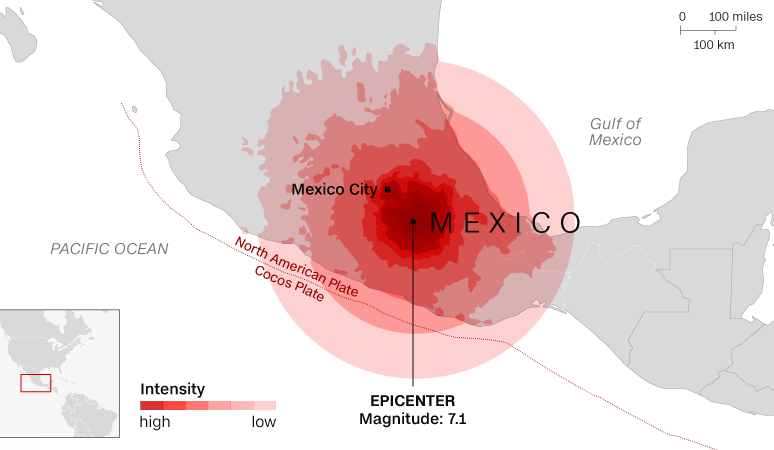Following the destruction from hurricanes Harvey and Irma in parts of North America, an earthquake hit Mexico for the second time this month causing damage in parts of the capital.
CNN said the strongest earthquake to affect Mexico in a century was the magnitude 8.1 earthquake, which hit off its southern coast Sept. 8. While the magnitude 7.1 earthquake that hit Sept. 19 was not as strong, its epicenter was in Puebla state, according to CNN, and the death count is at 324. The capital, Mexico City, is especially vulnerable to earthquakes because of its location, CNN said.
Junior Juan Pallach left his home in Mexico City to attend Oklahoma Christian University.
Pallach’s family lives in the south part of Mexico City. He said he was able to get in contact with them and that the earthquake did not directly affect them, but caused damage near them.
“Downtown Mexico City was the worst part,” Pallach said. “Right below Mexico City there is a fracture, so there’s constantly earthquakes. My family has never been badly affected, but we do get at least one earthquake each year for sure.”
Senior Andony Escudero said he was born in Mexico City and lived there for a total of eleven years before leaving his family to go to school. Escudero said his family in Mexico City is safe because they live on the outskirts of the city. However, he said he was surprised a large earthquake had not happened sooner.
“Actually, I had figured the earthquake was going to happen,” Escudero said. “Because if you look at tectonic plate movement, it tends to go in cycles. The last one happened about twenty years ago, which was really bad. I’m glad to see that less destruction happened this time, and it’s probably because all of the regulations that went into effect after 1985. So the earthquake definitely didn’t surprise me, because I had done mental calculations.”
Chair and Professor of Chemistry Bill Luttrell said science cannot predict earthquakes like it can predict hurricanes or tornadoes. The best thing to do is be prepared, and create structurally sound buildings to prevent the worst damage, Luttrell said.
“There are places in the world where they are much more common, and Mexico is one of them,” Luttrell said. “The risk of an earthquake has more to do with how well a community is prepared, as well as the strength of the earthquake. Seismographs can detect when an earthquake happens, but you’ll get the impact of the earthquake before a warning can go out.”
According to Pallach, the schools and institutions hold mandatory earthquake drills due to quakes being a fairly common occurrence. Escudero said the drills have an alarm that is similar to an alarm for a fire drill. They teach students and workers what to do in an earthquake situation, like standing in doorways or next to a column.
“The thing with this earthquake, there was a really bad earthquake in 1985 on Sept. 19,” Pallach said. “There were almost 30,000 deaths I think, so that was extremely bad. So everybody speaks about that earthquake. They commemorate that day with a drill every year at around 11 a.m. or noon. They did the drill at like 11 a.m. and at 1 p.m. the earthquake happened. So it was kind of crazy for everybody.”
According to Luttrell, the long-term damage caused by earthquakes can be significantly worse than the immediate damage.
“After an earthquake occurs, initially you get major damage and people are trapped in buildings,” Luttrell said. “The long term effects can be worse than the immediate. There’s loss of power, electrical lines are down, there are gas breaks and fires can occur. All the problems of a lack of water, food, communication and transportation. Sick people can’t get to medical care. It’s like a cascading disaster.”
Pallach said it is difficult to be in a different country when a disaster happens at home. He said he knows about the events because of the news and was proud of how quick people started helping.
“You know that something happened, but you’re so far away that you can’t do anything, and it’s kind of weird,” Pallach said. “It was good to see how much everybody did. It was crazy to see how much people helped, to the point that the Red Cross asked people to stop volunteering.”
Escudero said he heard about the earthquake before the news started reporting it, because his mother sent him a message saying his family was safe and not to worry. He saw the breaking news 10 minutes later, Escudero said.
“What sucks right now is that all of my friends are going out there to help and I feel so useless being stuck here,” Escudero said. “I feel like it’s what I should be doing — I should be there in the rubble, trying to help people, and I can’t do anything and that’s the worst feeling.”













Be First to Comment